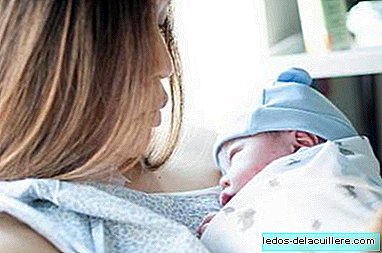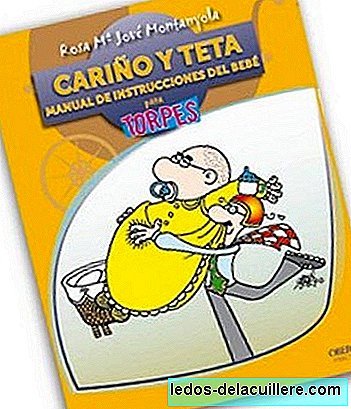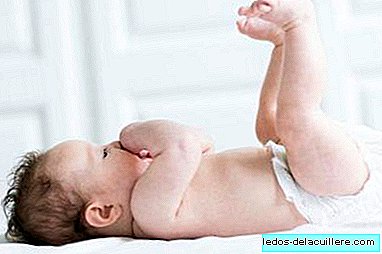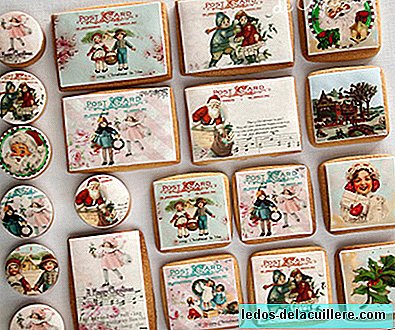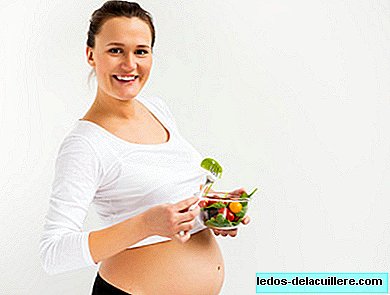
The nutrition of the future mother is key to a healthy pregnancy. Gestation is a stage with special nutritional needs that the mother must meet through a balanced diet. The best diet in pregnancy is a varied and complete diet, with foods that provide quality nutrients.
The amount of food, how to prepare it, the most convenient foods and those to avoid are some of the recommendations that we will give through Ten tips for healthy eating in pregnancy.
1) It is not a matter of quantity, but of quality
Being pregnant does not mean you have to eat for two. You don't have to eat much more, but eat better.
The recommended calorie intake during pregnancy is around 2,000 calories daily. 70 percent of the diet should be made up of cereals, bread and pasta, preferably wholemeal. At least five daily servings of fruit and vegetables. Two to three daily servings of protein and two to three servings of skim milk.
In the first trimester there is no need for extra calories. It is only from the second quarter onwards that calorie needs increase, but very little, around 300 more calories per day. Therefore, this does not justify exceeding sweets and unhealthy foods. Nor is it time to restrict calories.
With a balanced diet the body will receive the amount of energy it needs for the baby to develop properly. The important thing is to take foods rich in nutrients and vitamins such as folic acid, iron, calcium and iodine, but not in fats. The diet must be varied based on vegetables, fruits, cereals, dairy and legumes, not forgetting the daily intake of meat and fish protein.
The ideal weight gain in pregnancy is between 9 and 12 kilos, an increase that guarantees the adequate growth of the baby as well as the health of the mother, since an excess weight of the future mother can lead to complications in the Pregnancy and childbirth.
2) Eat several servings a day
It is preferable to consume small portions several times a day to promote digestion and combat the heaviness and heartburn typical of pregnancy. Instead of making copious intakes, make more meals throughout the day and chew food well.
Choose healthy snacks such as fruits or dairy to eat throughout the day between breakfast and lunch or between snack and dinner thus extending from four to six daily meals.
3) Essential nutrients
It is necessary that the pregnant ingest some essential nutrients for proper development of the baby. You can not miss calcium, for proper bone development, iron, for the formation of red blood cells, folic acid to prevent birth defects, iodine and omega 3, for better brain and cognitive development.
All these nutrients can be achieved through proper nutrition, but the reality shows that many times the intake of these nutrients is not enough, therefore nutritional supplements are recommended to cover possible deficiencies.

4) Stay hydrated
Water consumption is very important in pregnancy, as well as other liquids, for maintain adequate hydration. It facilitates digestion, the elimination of toxins and helps to alleviate the main discomforts of pregnancy such as headache, constipation and, contrary to what can be thought, fluid retention.
You can also drink natural fruit juices, although it is not always possible and sometimes you have to resort to packaged juices.
It is recommended to increase the intake of fluids in pregnancy between 0.5 and one liter.
It is forbidden to consume alcohol during pregnancy, not even a drop, because each woman is different and the amount that can affect the baby's development is unknown.
5) Safe foods
Fish: It is an important source of omega 3 and omega 6, essential nutrients in pregnancy, but large fish is also in mercury. Therefore, it is recommended to limit the intake of certain fish such as bluefin tuna and emperor, but there are blue and white fish that can be consumed with total safety such as bluefin tuna, salmon, hake and sole. The consumption of raw fish such as sushi or sashimi is not recommended.
Ham: It has always been associated with the risk of toxoplasmosis but recent research rules out this relationship. If the ham is well cured (more than 14 months) and treated there seems to be no risks. Anyway, follow the doctor's recommendations.
Eggs: Cook eggs safely to minimize the risk of food poisoning such as salmonella. They must be well cooked, not left without curdling.

6) How to cook food
Avoid adding too much salt to food when cooking. Cook grilled It is one of the healthiest ways to prepare food, especially for meats and vegetables because they retain their nutritional values without the need for added oils. Like steamed, ideal for fish and vegetables.
If you choose boil food, introduce them when the water is very hot and in large pieces to reduce the loss of vitamins and nutrients.
When it cooks baked you have to control the amount of oil and fats that are added to the food. The fried foods should be restricted to once a week and always in olive oil.
Al wok It is also an interesting way to cook food, especially vegetables, vegetables, meats and chicken. They are crispy and very tasty.
7) Foods that cannot be lacking in the pregnant woman's diet
We must prioritize foods of plant origin. That's why they can't be missing at least five pieces of fruits and vegetables. They are essential for their contribution in vitamins and minerals, especially green leafy vegetables (lettuce, spinach, chard) and fruits such as orange, which are some of the foods rich in folic acid and others rich in vitamin C that contributes to Better absorption of iron.
Meat, fish, dairy, legumes and nuts for being foods rich in iron, and calcium, in addition to the essential fatty acids of fish, among the foods richest in omega 3. Shellfish such as cockles and clams because of their iron and iodine content, a mineral necessary in the pregnancy.
Do not forget cereals, legumes and carbohydrates for their contribution of fiber and energy that must be part of the daily diet.
8) Foods to be restricted in the pregnant woman's diet
Fish is essential in the diet of the pregnant woman, but moderate consumption is recommended, two or three times a week.
Avoid game meat because it is very difficult to digest and produces many metabolic wastes.
Reduce candy consumption, soda, candy, pastries and trans fats. Its consumption must be sporadic. Also reduce coffee consumption and infusions.
As we have said before, eliminate alcohol consumption of the pregnant woman's diet.
9) Condiments in the pregnant woman's diet
When it comes to seasoning food, the best seasoning is undoubtedly the olive oil. It contains antioxidants and oleic acid that helps keep cholesterol level under control and for bone growth. It is also rich in essential fatty acids, omega 3 and omega 6, with proven benefits during pregnancy.
Use the lemon instead of vinegar to season the salads, vitamin C helps the absorption of iron from food.
10) Take care of yourself before and after pregnancy
Finally, remember that healthy eating should be a life behavior not only restrict it to the gestation period. A healthy diet before pregnancy is important to avoid congenital defects in the baby as well as the woman's body being better prepared to face the proper development of the baby.
On the other hand, after pregnancy and during breastfeeding, the physiological demands of women also increase, and therefore a healthy and balanced diet, rich in nutrients, is necessary to be able to offer the baby, through breast milk, the best diet.
Photos | © PhotoXpress.com, reproduced with permission. In Babies and more | Ten tips for a healthy and happy pregnancy, Nutrition recommendations during pregnancy, "During pregnancy and lactation increase the physiological demands of many nutrients." Interview with Marta Cuervo, Doctor of Nutrition


